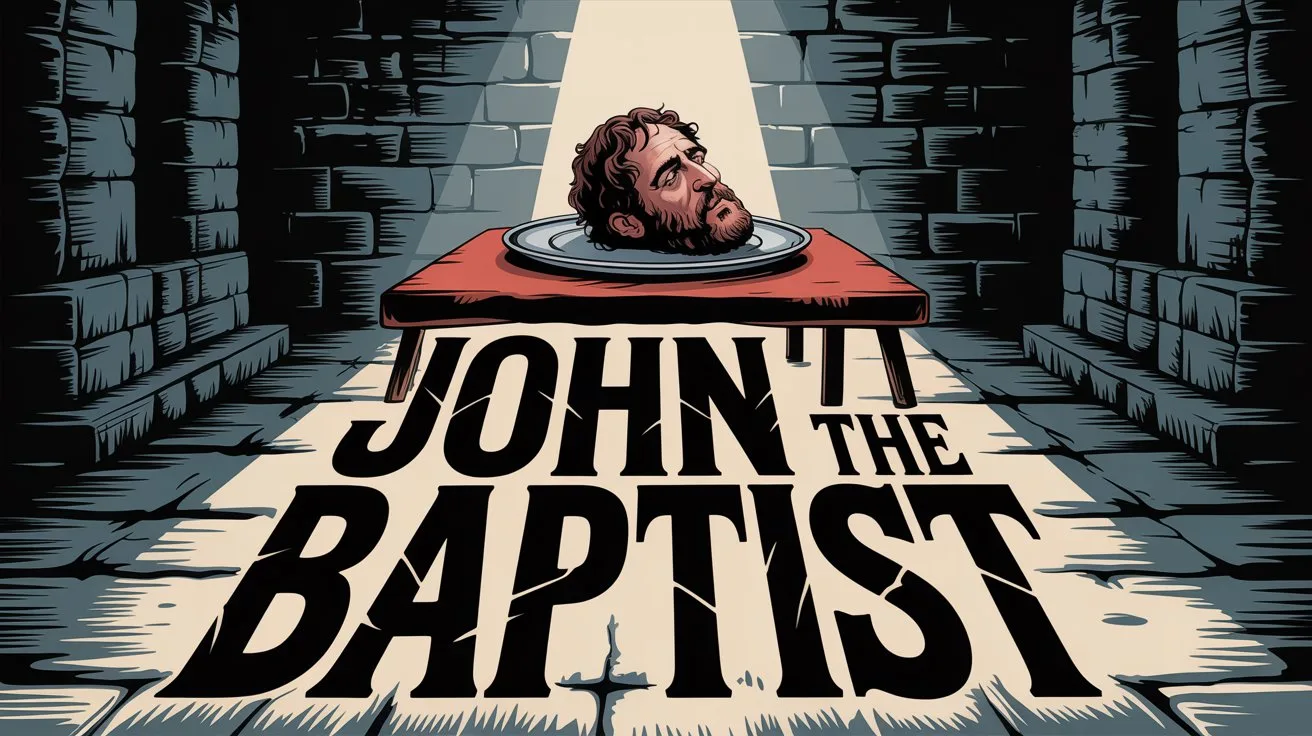John the Baptist preached righteousness without compromise, but his boldness cost him everything. His imprisonment, his question to Jesus, and his beheading are a sobering lesson in truth, courage, and the cost of discipleship.
Why John Was Imprisoned
Herod Antipas had unlawfully taken Herodias, the wife of his brother Philip, and married her. John the Baptist, true to his calling, rebuked Herod openly: “It is not lawful for you to have your brother’s wife.” (Mark 6:18). Like the prophets before him, John didn’t shy away from exposing sin, no matter who was guilty.
According to Luke 3:19–20, Herod had committed many evils, and John rebuked them all. But this particular sin, Herod’s unlawful marriage, provoked Herodias deeply. Mark 6:19 tells us,
“Therefore Herodias held it against him and wanted to kill him, but she could not.”
Herod himself was conflicted. Mark 6:20 says he feared John, knowing he was a just and holy man. He kept him safe, and even when he heard him, he did many things and heard him gladly. John’s righteousness convicted him, but he didn’t have the courage to repent. Instead, he imprisoned the truth.
Did John Question Jesus?
While sitting in prison, John sent two of his disciples to Jesus to ask, “Are You the Coming One, or do we look for another?” (Matthew 11:3). This is the same man who declared, “Behold! The Lamb of God who takes away the sin of the world!” (John 1:29). What happened?
Some say John doubted. But the Scriptures never call it doubt. It was an honest, prophetic question under pressure. John expected the Messiah to bring fire and judgment (Matthew 3:10–12), but here Jesus was healing and teaching—not purging the wicked. The expected pace of judgment hadn’t come. Was the Kingdom unfolding differently?
Jesus didn’t rebuke him. He pointed back to prophecy. Matthew 11:4–5 says,
“Go and tell John the things which you hear and see: The blind see and the lame walk; the lepers are cleansed… and the poor have the gospel preached to them.”
This fulfillment echoes Isaiah 35:5–6 and Isaiah 61:1. Then He added,
“And blessed is he who is not offended because of Me.” (Matthew 11:6)
Jesus affirmed the truth of His mission and gently encouraged John to stay the course.
Then turning to the crowd, Jesus honored John with one of the greatest commendations in Scripture:
“Among those born of women there has not risen one greater than John the Baptist.” (Matthew 11:11)
The Account of His Beheading
Herod’s birthday came, and he threw a lavish party. Herodias’ daughter danced before him, and in a moment of lust and pride, Herod made a foolish vow: “Whatever you ask me, I will give you, up to half my kingdom.” (Mark 6:23).
Coached by her mother, she demanded, “I want you to give me at once the head of John the Baptist on a platter.” (Mark 6:25). Herod was trapped. Though he was “exceedingly sorry,” he gave in to pride and peer pressure. Matthew 14:9 says,
“The king was sorry; nevertheless, because of the oaths and because of those who sat with him, he commanded it to be given.”
So the executioner went, beheaded John in prison, and brought his head to the girl, who gave it to her mother (Mark 6:27–28). The prophet’s voice was silenced, but his testimony lives on.
When John’s disciples heard, they came and took his body and laid it in a tomb (Mark 6:29). And when Jesus heard, He withdrew to a quiet place (Matthew 14:13), showing how deeply He was moved by the death of His forerunner and friend.
The Prophetic Weight of His Death
John’s death was not just a tragic event; it was the closing act of the Old Covenant prophet. Matthew 11:13 says,
“For all the prophets and the law prophesied until John.”
John came in the spirit and power of Elijah (Luke 1:17). Malachi 4:5 declared,
“Behold, I will send you Elijah the prophet before the coming of the great and dreadful day of the LORD.”
And Jesus confirmed, “He is Elijah who is to come.” (Matthew 11:14)
His death aligns with the martyrdom of righteous men throughout Israel’s history. Jesus later said, “You are witnesses against yourselves that you are sons of those who murdered the prophets.” (Matthew 23:31) John stood in their line, faithful unto death. Hebrews 11:37 testifies,
“They were stoned, they were sawn in two, were tempted, were slain with the sword.”
The Kingdom and the Cost
John’s life and death remind us that proclaiming the truth will cost us. Jesus warned, “You will be hated by all for My name’s sake.” (Luke 21:17) Paul declared, “Yes, and all who desire to live godly in Christ Jesus will suffer persecution.” (2 Timothy 3:12)
John didn’t live to see the crucifixion or resurrection. But his reward was never earthly. He saw the Lamb. He prepared the way. He decreased so Christ could increase (John 3:30).
His death wasn’t the end; it was a seed sown in the soil of God’s Kingdom. And when Christ returns, the voice that cried in the wilderness will rise again to meet the One he heralded.
My Final Thoughts
John the Baptist was a prophet of courage, truth, and conviction. He stood boldly before kings, called sin what it was, and never wavered. Even in prison, even in questions, he pointed people to Jesus. His death was brutal, but his life was faithful. May we learn from his example. Speak truth without fear. Stand firm in righteousness. And when our strength wavers, may we still ask our questions, not in rebellion but in faith. Jesus is not offended by the weary heart that seeks Him.
Truth may cost you friends, reputation, or even freedom. But in the end, truth always wins, because Christ is the Truth. Like John, may we live for that Truth, and if called to, die for it.





 Get the book that teaches you how to evangelize and disarm doctrines from every single major cult group today.
Get the book that teaches you how to evangelize and disarm doctrines from every single major cult group today.